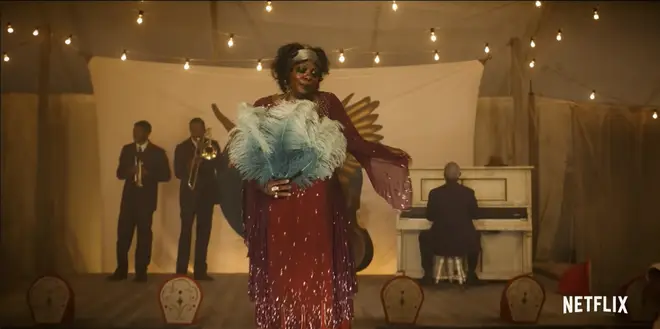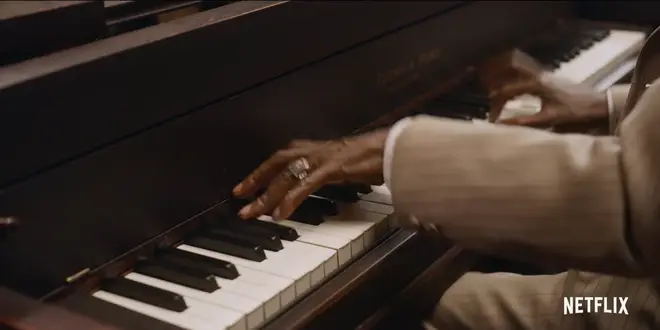On Air Now
Relaxing Evenings with Zeb Soanes 7pm - 10pm
26 April 2021, 10:42

Ma Rainey's Black Bottom | Official Trailer | Netflix
‘Ma Rainey’ composer, Branford Marsalis, on the Netflix film’s power in expressing the heart of the blues, and encapsulating an essential part of American music history.
“They don’t care nothing about me,” says legendary blues singer Ma Rainey in the Netflix film adaptation of August Wilson’s 1982 play, Ma Rainey’s Black Bottom. “All they want is my voice.”
Ma Rainey’s Black Bottom depicts, through the dramatic events of one Chicago recording session with Ma, the ‘Mother of the Blues’ and her band, the dichotomy of the Black struggle between the north and the south of 1920s America.
And it’s a love letter to the blues, and music born of place, passion and pain.
The film, which has been named one of the best movies of 2020 by the American Film Institute, and nominated for scores of awards in this year’s BAFTA Longlist, has specially-arranged and composed blues music at its heart.
We sit down, virtually, with the composer behind the film’s soundtrack, Branford Marsalis, to discuss the music’s magic and the movie’s legendary protagonist.

The True Story Behind Ma Rainey's Black Bottom | Netflix
Ma Rainey’s Black Bottom director, George Wolfe, knew Branford Marsalis and invited him onto the project early on. Marsalis would arrange many of Ma Rainey’s most famous songs for the soundtrack – both on-screen and off – as well as writing original music for the film, including the song ‘Baby Let Me Have It All’.
Because the music Marsalis was to write and arrange was being ‘performed’ by the characters in the film, he needed to get it ready early in the production, and send it off in time for scenes to be filmed.
“I had to turn this around very quickly as the actors had to hear music to mimic and mime to their parts,” Marsalis tells Classic FM.
From previous work in film, and watching people playing musicians in other movies, Marsalis was determined for the actors to look natural; look like real, working musicians.
“I said to the cast, ‘you’re going to get this music, you’re going to listen to it, you’re going to sing your parts and, if you can sing your parts, you can play your parts. And make sure your fingers are never moving when there’s no sound,’” Marsalis laughs.
And they all did it to a tee. “They were a fabulous cast,” the composer agrees.

The late Chadwick Boseman, who plays the lead character Levee, even learned the cornet for his part, and requested a trumpet fingering chart to get it just right. “His eye for detail was incredible”, Marsalis reflects.
Boseman sadly died of cancer, at just 43, after filming Ma Rainey, making it the last feature film he appeared in.
Dubbed the ‘Mother of the Blues’ Ma Rainey, born Gertrude Pridgett, was a professional blues singer, and among the first generation of African-American artists to record their music.
Active in the first couple of decades of the 1900s, Ma recorded genre-defining music but also stands out for the power she held over her own craft. She held on to the writing credits for her own songs, rather than them being credited elsewhere as happened under the eye of many record labels, and she actually owned her own music venues.
“Quite apart from the fact she was Black,” Ma Rainey composer Branford Marsalis says, “being a woman in the 1920s and owning things was incredible. She had to have an incredible kind of strength to get away with doing it her way like she did.
“She was a business woman and she preferred the South to the North. She didn’t want to move to the north of America like others did – New York was the place to be – and she did things in her own way, touring and getting record deals where she happened to be.”
Bessie Smith, who was close with Ma, and who more people may have heard of, had a very different situation with her label Columbia Records. She played ball, essentially, and toed the line Ma Rainey resisted. And that allowed her to be in a situation that would perpetuate her name beyond her own lifetime.
Read more: Hazel Scott, the forgotten jazz virtuoso who fought racial segregation >

“The fact there are hundreds of photos of Bessie Smith, and only seven in existence of Ma Rainey, is because Ma Rainey preferred the south to the north,” Marsalis explains.
“Ma Rainey owned two of her own theatres in Georgia in the segregated south. She owned property. Southerners could, but there’s no chance that a Black person could own theatres in Chicago or New York.
“Ma saw this dichotomy, and she saw the difference between freedom in 1920 and the illusion of freedom in 1920.”
Ultimately, for Marsalis, what Ma left behind in her music gives us everything we need to know. Her songs speak to the struggle, pain, power and passion of Black artists in America.
And she played with everybody, too.
“She’s really had an incredibly varied collection of songs and artists she performed with,” Marsalis tells us. “Louis Armstrong played with Ma Rainey; Sidney Bechet played with Ma Rainey; the great Coleman Hawkins played with Ma Rainey. She was an incredible entertainer, an excellent singer and a great business woman.”

Blues is a grassroots style of music that originated in the deep south of America in around the 1860s, incorporating African musical traditions, African-American work songs and field hollers, and spiritual songs. It’s distinguished by syncopated rhythms and its twelve-bar chord pattern and form.
“The epitome of blues music is its sound,” composer and saxophonist, Branford Marsalis, tells Classic FM.
“When I was in school, when my teachers would talk about the blues, they would talk about form. But in my twenties, I started really listening to the blues and it’s really an American song form that consists of a one (i) chord, a four (IV) chord, and a five (V) chord, all in no certain order, but that show up eventually at the whims of the performer.
The sound of the blues, really, is evident in a whole spectrum of American music of this time, and later.
“It’s been given this racial component,” Marsalis says. “In the 50s, white musicians playing a certain kind of music and Black musicians playing the same had two completely different titles for their music.”
‘Blues’ then became a shorthand for Black singers. “When Billie Holiday was taken to a hospital in San Francisco and arrested for drug abuse, newspaper headlines at the time said ‘Blues Singer Billie Holliday’,” Marsalis says. “Billie Holiday is not a blues singer. Billie Holiday is a jazz singer.”

Ma Rainey - "Jealous Hearted Blues" 1924
Ma Rainey is portrayed by Viola Davis in the 2020 biopic about the blues singer.
The late Chadwick Boseman plays Levee, a talented trumpet and cornet player looking for his own break, and causing “trouble” for Ma.
Glynn Turman (Toledo on the piano), Colman Domingo (trombonist Cutler) and Michael Potts (Slow Drag, on double bass) play Ma’s musicians, and Dusan Brown also makes an appearance, as Ma’s nephew.
Jeremy Shamos plays Irvin, Ma’s agent at the label recording the session depicted in the film, and Jonny Coyne plays Mel Sturdyvant, who’s producing the record.
Over 100 extras appeared in the Ma Rainey’s tent performance scene, set in the south, near the beginning of the film.
Ma Rainey’s Black Bottom made Oscars history in 2021 when it scooped the Oscars for Best Achievement in Makeup and Hairstyling, and Best Achievement in Costume Design. Ann Roth won the Oscar for costumes, while makeup artist Sergio Lopez-Rivera, hair department head Mia Neal, and star Viola Davis’ personal hairstylist, Jamika Wilson, took home the statue for Best Makeup and Hairstyling. Neal and Wilson are the first-ever Black stylists to win an Oscar.
Lead actors, the late Chadwick Boseman and Viola Davis as Ma, were both nominated in their Leading Role categories, and the film was also nominated for Best Achievement in Production Design in the 2021 Oscars.
Ma Rainey’s also saw Boseman scoop the Golden Globe for the Drama Best Performance by an Actor in a Motion Picture, with Viola Davis also nominated in the category.
The film has also taken home BAFTAs for costume design and hair and makeup, among a raft of other accolades.